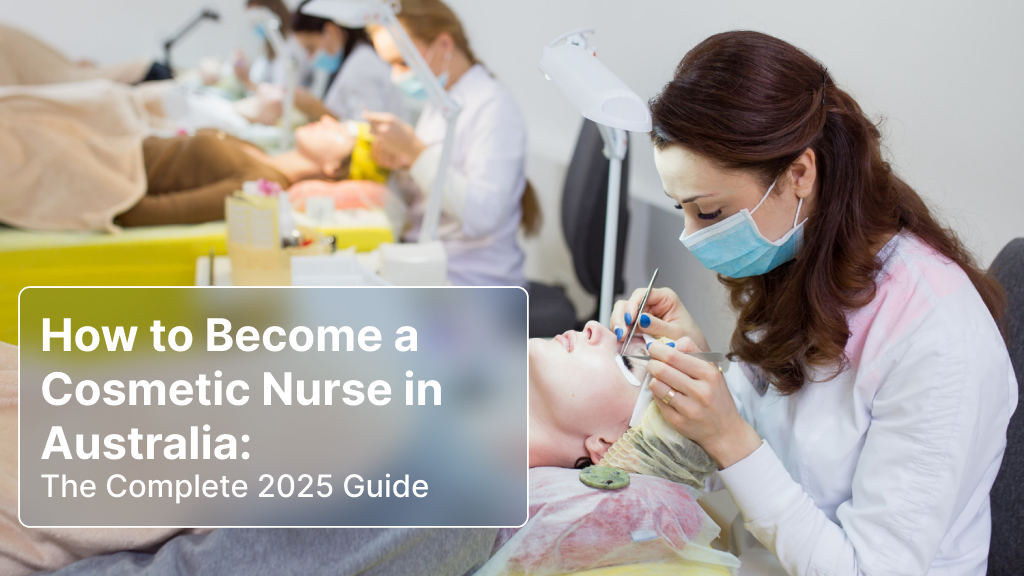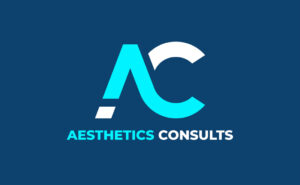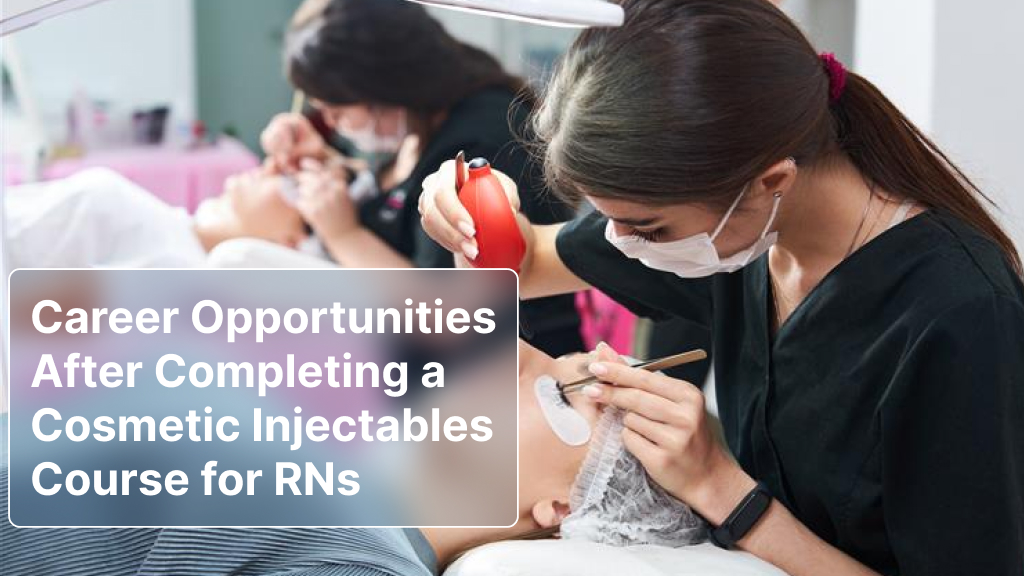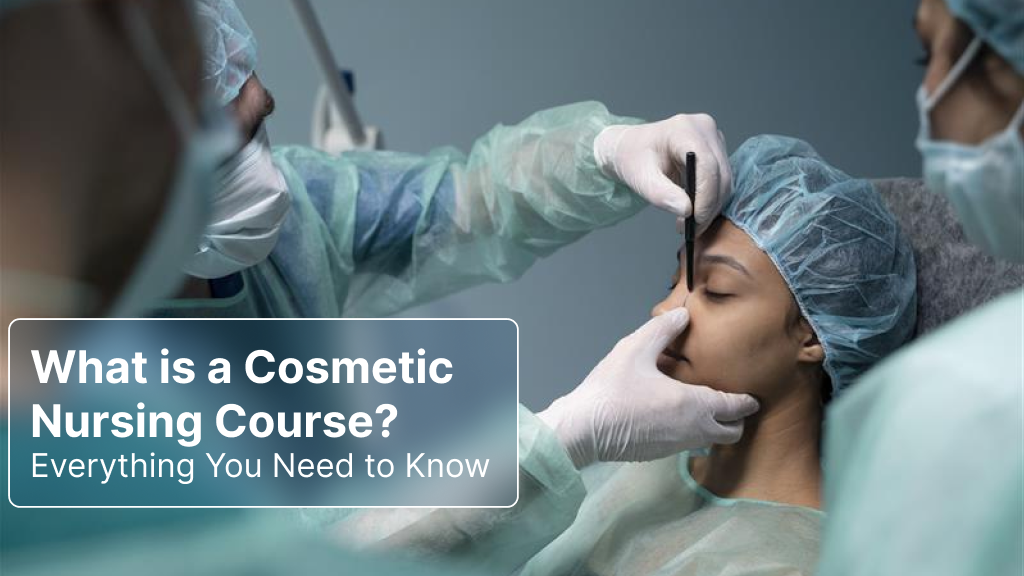
How to Become a Cosmetic Nurse in Australia: The Complete 2025 Guide
[This blog is a simple and clear resource for anyone looking to become a cosmetic nurse in Australia. It covers each step in the process—from nursing registration to training and mentorship—so you know exactly what to expect in 2025.]
Introduction
If you’re drawn to both healthcare and beauty, becoming a cosmetic nurse in Australia might be a rewarding path. This role merges clinical skills with procedures like injectables and skin treatments. Over 200,000 cosmetic procedures happen each year. More Australians are choosing non-surgical options to enhance their appearance.
However, getting started in this field can be complex. It requires a clear understanding of qualifications, training programs, and regulations. Understanding the steps can make your journey easier. It can also lead to a career that blends care, precision, and visible results in a growing field.
Table of Contents
- Your First Step: Registering as a Qualified Nurse
- What Comes After Registration?
- Building Skills Through Cosmetic Nurse Training
- The Role of Mentorship in the Cosmetic Nursing Journey
- Navigating the Legal and Ethical Side of Aesthetic Nursing
- Adapting to Modern Tools and Techniques
- Getting the Right Support: What Cosmetic Nurses Need Beyond Training
- How to Become a Cosmetic Nurse: Common Mistakes to Avoid
- Is This Career Right for You?
- Conclusion
- FAQ
Your First Step: Registering as a Qualified Nurse
Before you can work in the cosmetic space, you’ll need to become a Registered Nurse (RN). That means completing an approved Bachelor of Nursing program in Australia or an equivalent overseas qualification and registering with the Australian Health Practitioner Regulation Agency (AHPRA).
This registration ensures you’re legally eligible to practice as a nurse in the country. It also confirms you’ve met the national standards of training and clinical experience. Many people overlook this essential first step in their excitement to dive into cosmetic treatments, but it’s non-negotiable and forms the foundation of your career.
What Comes After Registration?
Once you’re officially recognised as a registered nurse, you can begin exploring the world of cosmetic treatments. However, unlike some other fields, cosmetic nursing is not something you can immediately jump into without extra training and support.
Here’s what typically follows:
- Gain Practical Clinical Experience
Spending time in hospital or clinical environments builds your confidence, strengthens patient care skills, and gives you an understanding of health and safety protocols. Experience in dermatology, plastics, or surgical departments is particularly relevant.
- Choose Specialised Training in Aesthetic Procedures
You’ll need to undergo specific training programs that cover topics such as botulinum toxin, dermal fillers, skin anatomy, and infection control. This learning is both theoretical and hands-on, ensuring you’re not only book-smart but also technically skilled.
- Join a Mentorship Program
Mentorship is a crucial step many new nurses overlook. Having access to an experienced mentor can fast-track your learning, provide honest feedback, and reduce the risk of making errors in a clinical setting.
Building Skills Through Cosmetic Nurse Training
The right training does more than teach you procedures—it shapes how you think, consult, and handle patients. Cosmetic nurse training requires more than injecting; it demands decision-making, empathy, and technical precision.
Training usually focuses on the following areas:
- Consultation Process: You’ll learn how to assess a patient’s skin, medical history, and treatment goals to recommend safe and effective options.
- Aesthetic Injectables: You’ll master injectable treatments, such as botulinum toxin and dermal fillers, understanding how to deliver subtle and natural-looking results.
- Anatomy and Facial Mapping: Courses often include advanced knowledge of muscle structures, fat compartments, and vascular pathways.
- Safety and Emergency Response: Recognising and responding to complications like vascular occlusion is critical for patient safety.
- Regulatory Standards: Training includes lessons on informed consent, patient documentation, and operating within your legal scope.
By completing a training program that includes these elements, you position yourself as a knowledgeable and responsible aesthetic practitioner.
The Role of Mentorship in the Cosmetic Nursing Journey
Becoming confident in your skills takes time, and that’s where mentorship becomes incredibly valuable. While training provides structure, mentorship offers insight from real-world experience. It allows you to:
- Observe Treatments: Watching mentors perform consultations and procedures helps you understand what success looks like in practice.
- Ask Clinical Questions in Context: Reading about managing complications is one thing—seeing your mentor handle them is another.
- Develop a Treatment Approach: Every cosmetic nurse develops their own style over time. A mentor helps guide your early treatment philosophy and aesthetic eye.
A mentor also helps with the emotional side of the profession. From dealing with nervous patients to navigating occasional treatment mishaps, having someone to talk to is key in those early months.
Ready to advance your cosmetic nursing career? Join Aesthetics Consults for expert training and mentorship.
Navigating the Legal and Ethical Side of Aesthetic Nursing
Once you begin offering cosmetic treatments, you’re operating in a space that’s highly regulated. While not as restrictive as surgical medicine, the field requires strict adherence to national and state health policies.
Here are some areas where legal awareness is essential:
- Scripting Laws: Nurses cannot independently prescribe injectables in Australia. Treatments like botulinum toxin and fillers must be prescribed by a doctor or nurse practitioner. Some training providers also offer scripting support systems.
- Consent and Documentation: Patients must be fully informed of risks and outcomes. Detailed consent forms and pre-treatment documentation are part of standard practice.
- Scope of Practice: Always work within what your training and qualifications allow. Performing treatments beyond your scope can put patients at risk and open you to legal action.
Adapting to Modern Tools and Techniques
In 2025, cosmetic nursing isn’t just about syringes and skin care. Many practitioners now incorporate technology to enhance precision and results. One example is the use of ultrasound in aesthetic medicine.
Ultrasound-guided injecting is becoming more common because it:
- Improves treatment accuracy
- Reduces the risk of vascular complications
- Helps map individual patient anatomy
While not every clinic uses this technology, being trained in its use can set you apart and improve patient safety.
Other areas where technology is playing a role include advanced imaging, digital patient tracking, and automated scripting systems. These tools improve the patient experience while supporting nurses in delivering safe and personalised care.
Getting the Right Support: What Cosmetic Nurses Need Beyond Training
Beyond skills and certification, cosmetic nurses in Australia need proper administrative and clinical support to run or work within a functional aesthetic practice.
Some key support services include:
- Scripting Assistance: Efficient prescription processes ensure legal compliance and reduce delays in treatment.
- Ongoing Education: Access to refresher courses, webinars, or professional events helps you stay current with trends and regulations.
- Clinic Integration Guidance: Nurses entering the aesthetic space often need help understanding how to work within a clinic structure, handle bookings, and communicate with patients effectively.
Support doesn’t stop after your first course. Continuing to invest in your development builds a long-term and sustainable career.
How to Become a Cosmetic Nurse: Common Mistakes to Avoid
If you’re aiming to succeed in cosmetic nursing, it helps to learn from those who’ve already walked the path. Here are a few pitfalls to avoid:
- Skipping Practical Training: Theoretical knowledge isn’t enough. Without hands-on sessions, you’re likely to lack confidence in real patient interactions.
- Ignoring Mentorship: Trying to work solo early on can lead to poor outcomes or complications. Learn from those with experience.
- Neglecting Compliance: Overlooking patient consent or documentation procedures can have serious legal consequences.
- Chasing Trends Over Fundamentals: New techniques and treatments come and go. Focus on mastering core procedures first.
Is This Career Right for You?
Aesthetic nursing isn’t just about appearance—it’s about care, safety, and results. You’ll need patience, strong attention to detail, and a desire to keep learning. Cosmetic procedures are elective, and patients have high expectations. That means your role involves both technical execution and emotional intelligence.
If you enjoy working one-on-one with people, problem-solving, and seeing visible results from your work, this profession offers personal and professional fulfilment. With the right training and support, you can build a thriving career that merges health science and artistry.
Conclusion
To build a career in aesthetic medicine, you need dedication, education, mentorship, and legal knowledge. Whether beginning or specialising, the right guidance is essential. Ready to advance your journey? Aesthetics Consults provides expert training and support. They help cosmetic nurses succeed and grow with confidence in their field.
Start your cosmetic nursing journey with Aesthetics Consults.
FAQs
You must first complete an approved Bachelor of Nursing program and register as a nurse with AHPRA before pursuing specialised cosmetic nurse training.
Yes, specialised training in aesthetic procedures like injectables and skin treatments, along with practical experience and mentorship, is essential.
No, cosmetic nurses in Australia cannot prescribe injectables independently; a prescription from a doctor or nurse practitioner is required.
Mentorship is crucial for gaining real-world experience, developing clinical skills, and building confidence in performing aesthetic procedures safely.
Nurses must follow scripting laws, obtain informed consent, maintain accurate documentation, and always work within their scope of practice to ensure patient safety and compliance.




